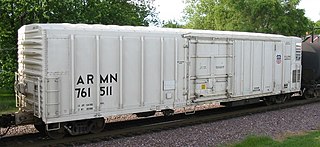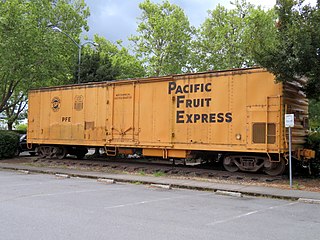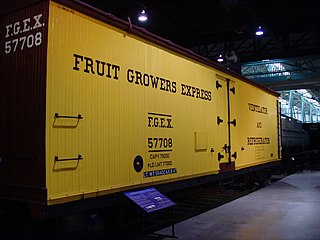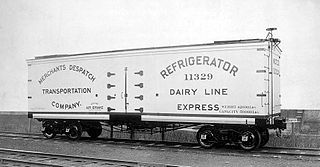
The Chicago, Milwaukee, St. Paul and Pacific Railroad (CMStP&P), often referred to as the "Milwaukee Road", was a Class I railroad that operated in the Midwest and Northwest of the United States from 1847 until 1986.

A refrigerator car is a refrigerated boxcar (U.S.), a piece of railroad rolling stock designed to carry perishable freight at specific temperatures. Refrigerator cars differ from simple insulated boxcars and ventilated boxcars, neither of which are fitted with cooling apparatus. Reefers can be ice-cooled, come equipped with any one of a variety of mechanical refrigeration systems, or utilize carbon dioxide as a cooling agent. Milk cars may or may not include a cooling system, but are equipped with high-speed trucks and other modifications that allow them to travel with passenger trains.

The Grand Trunk Western Railroad Company is an American subsidiary of the Canadian National Railway operating in Michigan, Illinois, Indiana, and Ohio. Since a corporate restructuring in 1971, the railroad has been under CN's subsidiary holding company, the Grand Trunk Corporation. Grand Trunk Western's routes are part of CN's Michigan Division. Its primary mainline between Chicago and Port Huron, Michigan serves as a connection between railroad interchanges in Chicago and rail lines in eastern Canada and the Northeastern United States. The railroad's extensive trackage in Detroit and across southern Michigan has made it an essential link for the automotive industry as a hauler of parts and automobiles from manufacturing plants.

Gustavus Franklin Swift, Sr. was an American business executive. He founded a meat-packing empire in the Midwest during the late 19th century, over which he presided until his death. He is credited with the development of the first practical ice-cooled railroad car, which allowed his company to ship dressed meats to all parts of the country and abroad, ushering in the "era of cheap beef." Swift pioneered the use of animal by-products for the manufacture of soap, glue, fertilizer, various types of sundries, and even medical products.

The Budd Company was a 20th-century metal fabricator, a major supplier of body components to the automobile industry, and a manufacturer of stainless steel passenger rail cars, airframes, missile and space vehicles, and various defense products.

The J.G. Brill Company manufactured streetcars, interurban coaches, motor buses, trolleybuses and railroad cars in the United States for almost ninety years, making it the longest-lasting trolley and interurban manufacturer. At its height, Brill was the largest manufacturer of streetcars and interurban cars in the US and produced more streetcars, interurbans and gas-electric cars than any other manufacturer, building more than 45,000 streetcars alone.

Pacific Fruit Express was an American railroad refrigerator car leasing company that at one point was the largest refrigerator car operator in the world.

Fruit Growers Express (FGE) was a railroad refrigerator car leasing company that began as a produce-hauling subsidiary of Armour and Company's private refrigerator car line. Its customers complained they were overcharged. In 1919 the Federal Trade Commission ordered the company's sale for antitrust reasons.

The Santa Fe Refrigerator Despatch was a railroad refrigerator car line established as a subsidiary of the Atchison, Topeka and Santa Fe Railway in 1884 to carry perishable commodities. Though the line started out with a mere 25 ventilated fruit cars and 8 ice-cooled refrigerator cars, by 1910 its roster had swollen to 6,055 total units.
Burlington Refrigerator Express (BREX) was a railroad refrigerator car leasing company that was formed on May 1, 1926 as a joint venture between the Chicago, Burlington and Quincy Railroad (CB&Q) and the Fruit Growers Express Company. The move helped the FGE expand its business into the Pacific Northwest, and added almost 2,700 ice bunker units to the existing car pool already under lease by the Burlington to the FGE and Western Fruit Express (WFE).

Western Fruit Express (WFE) was a railroad refrigerator car leasing company formed by the Fruit Growers Express and the Great Northern Railway on July 18, 1923 in order to compete with the Pacific Fruit Express and Santa Fe Refrigerator Despatch in the Western United States. The arrangement added 3,000 cars to the FGE's existing equipment pool. It is now a wholly owned subsidiary of the Burlington Northern Santa Fe Corporation (BNSF), the Great Northern's successor. The success of the WFE led to the creation of the Burlington Refrigerator Express (BREX) in May 1926.

The Merchants Despatch Transportation Company was established in 1857 or 1858 by the American Express Company of New York. The entity was reformed as a joint stock trading company on June 1, 1869, with ownership divided among the Cleveland, Columbus, Cincinnati and Indianapolis Railway (CCC&I), the Lake Shore and Michigan Southern Railway, and the New York Central Railroad (NYC), all part of the Cornelius Vanderbilt rail empire.

The Swift Refrigerator Line was a private refrigerator car line established around 1875 by Chicago meat packer Gustavus Swift, the founder of Swift and Company.

Two distinct and separate railroad refrigerator car companies have operated under the name Western Refrigerator Line.

The Armour Refrigerator Line was a private refrigerator car line established in 1883 by Chicago meat packer Philip Armour, the founder of Armour and Company.

The St. Louis Refrigerator Car Company (SLRX) was a private refrigerator car line established on February 3, 1878, by Anheuser-Busch, the brewer's first subsidiary. SLRX was formed to facilitate large-scale distribution of the A-B's products via the U.S. rail network. The SLRX not only built its own bunkerless reefers, but maintained and operated them as well.

The American Refrigerator Transit Company (ART) was a St. Louis, Missouri-based private refrigerator car line established in 1881 by the Missouri Pacific and Wabash railroads. It is now a subsidiary of the Union Pacific Corporation.
The North Western Refrigerator Line (NWX) was a Chicago, Illinois-based private refrigerator car line established in 1924, one of the last such companies to be formed. Between 1924 and 1940 the company acquired more than 3,000 new wood refrigerator cars originally built by the American Car and Foundry Company, and leased the former Ringling Brothers Circus railroad car plant in Baraboo, Wisconsin to serve as a car shop.
The West India Fruit and Steamship Company operated a railcar ferry service between the Port of Palm Beach, Florida, and Havana, Cuba, from shortly after World War II until deteriorating relations between the United States and Cuba culminated in the United States embargo against Cuba. The company offered six of its ferries for sale in June 1961, citing the fact that "trade had dwindled to the vanishing point" and service ceased in August 1961.

















